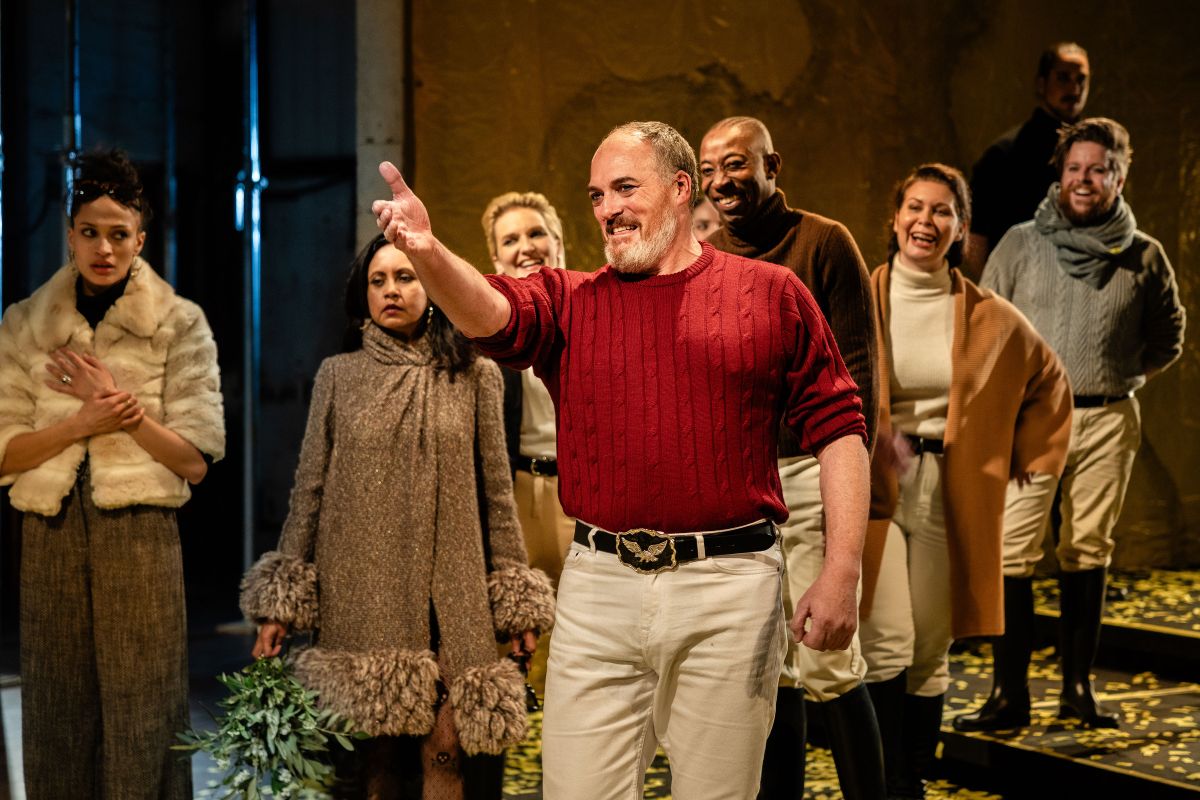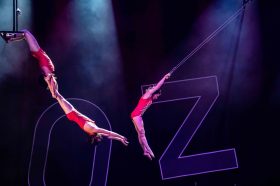In our modern world, a cynic would be forgiven for thinking that a good speech no longer has the same political power it once did. In our post-truth 24-hour news cycle, when information is disseminated in 15-second videos or 280-character ejaculations, can a perfectly timed, artfully executed oration change the course of history, as it once did for Mark Antony and Rome?
While we’re much more likely to see a viral video than a Shakespearean-level eloquent speech from the mouths of our politicians or public figures, the Melbourne Shakespeare Company’s visceral and modern production of Julius Caesar is a reminder of the continued relevance of Shakespeare’s complex historical tragedy. Who doesn’t remember Julia Gillard’s “Misogyny” speech? Grace Tame’s “Hear Me Now” speech? Kevin Rudd’s “Sorry” speech? Words well-chosen, spoken and timed, move. And they can light a spark that can lead to major change.
This production of Julius Caesar, directed by Richard Murphet, was performed at Melbourne’s fortyfivedownstairs. The dual seating banks were curved inwards, towards one corner of the oblong room, in a semblance of a Roman amphitheatre. The large windows and exposed brick wall of the room were employed as a borrowed backdrop with the addition of numerous metal construction floor-to-ceiling posts, interspersed between the theatre’s load-bearing ones, in a contemporary nod to Roman columns. Wide steps leading upward towards the right of the performance space enabled the actors to gain some height during some dramatic points of the play.
The costumes of the patricians – the Roman elite – were modern: a mix of knee-high black gumboots, tight white pants, cable knit jumpers and beige trench coats, which gave off a whiff of Louis XV’s army as dressed by Polo Ralph Lauren in 2023, on their way to a polo match. Other symbolic touches of Rome were evident in Julius Caesar’s red jumper, and the patricians’ belt buckles, which were adorned with an eagle. The Roman plebians – the common folk – who were cheering Caesar’s triumphant return to Rome after defeating his deceased arch rival Pompey’s sons at the start of the play, wore hoodies and tracksuit pants; the tribunes, trying to move the crowds on, were in security uniforms.
The modern production design did not anchor the performance in any particular place, which enabled the play’s themes to be interpreted in any manner of ways. Although some elements of the story (particularly the Roman loyalty to the Republic and the notion of personal ambition being a threat to Rome) were very much distinct to this period of political history, we could still relate to the complex emotional turbulence of the characters and the political machinations at play.
The excellent cast of actors brought Shakespeare’s words thrillingly to life: their voices technically robust enough to stand up to the demands of articulation and projection without amplification, while conveying meaning through deep connection to and understanding of the nuances and power of the language. It was a joy to experience.
Of particular note was Natasha Herbert as Mark Antony – she had the two most famous, demanding and brilliant speeches of the play, and they were both exceptional. The abject torment and horror and outrage coursed through her as she swore vengeance over Caesar’s body, ‘A curse shall light upon the limbs of men’, after his assassination. And the much more calculated ‘Friends, Romans, countrymen’ speech at Caesar’s funeral was an exercise in restraint. Herbert was a vital force on stage, exciting to watch and a wonderful, gifted actor.
Excellent also was Matthew Connell as Brutus, who managed to convey the right mix of loyalty to the Roman Republic and conflict at conspiring against Caesar. Brutus can easily come off as a bit of a – well – brute, but Connell’s bearing and youth made him seem a tragic figure of his own ideology and naivety rather than simply a blunt instrument. Hunter Perske was a perfectly cast Caesar – a king among men, in stature, bearing and presence – as was Mark Wilson as the fascinating and easily villainised Gaius Cassius Longinus, who first suggests to Brutus that Caesar’s power may in fact be a threat to Rome, and is a major figure in the assassination plot.
An area that let the production down somewhat was the sound design, which was relatively distracting. It may have been a volume issue more than anything else (I felt it would have been saved by turning it down about 50%) and was at its most pronounced during Brutus’ funeral speech, throughout most of which he was forced to talk over very loud crowd noises. Fortunately, the sounds mostly died down before Mark Antony’s speech or it would have been a real tragedy. The design itself did lend power to particular moments – the beat of drums at Philippi felt stirring and ominous – but it perhaps could have been used more sparingly, as the bank of sounds felt repetitive when used throughout whole scenes.
Read: Theatre Review: Tae Tae in the Land of Yaaas!, QPAC
There are so many reasons Julius Caesar continues to be relevant for contemporary audiences, and this well-designed, thoughtful and brilliantly performed production was a stark reminder of that. Most significantly, it underlined the power of words to galvanise an idea, rally people and change history. Modern politicians, leaders and disruptors should take note.
Julius Caesar
Melbourne Shakespeare Company
fortyfivedownstairs
Director: Richard Murphet
Artistic Director: Jennifer Sarah Dean
Producer: Michael Mack
Production Designer: Dale Ferguson
Lighting Designer: Kris Chainey
Cast: Aisha Aidara, Annabelle Tudor, Anthea Davis, Hunter Perske, Jacqueline Whiting, Leah Baulch, Malith, Mark Wilson, Mark Yeates, Matthew Connell, Michael Sakinofsky, Michelle Perera, Natasha Herbert, Sebastian Li, Terry Yeboah, and Tony Reck
Julius Caesar was performed from 24 August – 3 September 2023.





